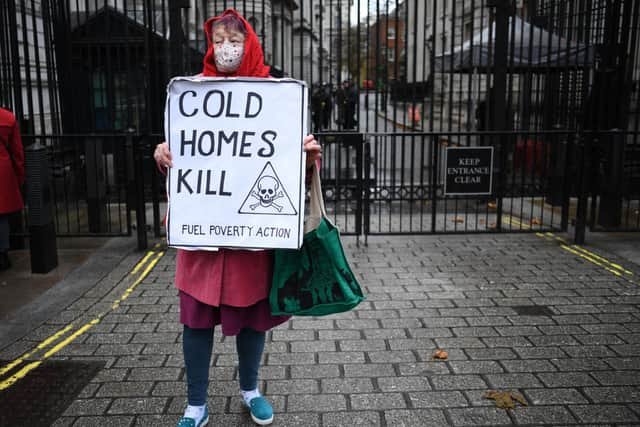'Eradicating poverty' would take political bravery, leadership and astute policies. Major change in Scotland looks unlikely – John McLaren
Let’s get real, you won’t eradicate poverty, in terms of the dictionary definition of “doing away with completely”. Better to be more honest, but still ambitious, and claim your goal is to eradicate destitution, as defined by the lack of a set number of essential items. Which then leads to the question of what type and degree of poverty is, for now, acceptable.
In 2016 the Joseph Rowntree Foundation (JRF) came up with a reasonable working definition of what ‘solving’ poverty in the UK might mean: first, an end to destitution; second, less than one-in-ten people living in poverty, ie below 60 per cent of median income, at any one time; and third, nobody living in poverty for more than two years. In other words, the deepest forms of poverty need to be weeded out and poverty itself should be small-scale and not permanent.
Advertisement
Hide AdAdvertisement
Hide AdAll this seems eminently sensible, if highly ambitious, given past efforts. By contrast, the current focus is on poverty of any degree and particularly when it affects children. This approach has obvious results. Those who are helped out of poverty tend to be those who are at the edge of it, not deep in it, and children are replaced by others in the poverty total.
A JRF report published on the same day as the FM’s mini-manifesto showed that those living in ‘very deep poverty’ – a possible proxy for destitution as it identifies those on the lowest incomes, ie below 40 percent of median income – has risen dramatically since the mid-1990s, even as the overall number of Scots living in poverty has fallen. So, as expected, consecutive policies have led to a reduction in those who are ‘just’ in poverty while those who are the worst off continue to suffer, indeed to a greater extent than before.
Who are these people? Increasingly they are ‘single adults without kids’, although the proportion of people ‘living in a family where someone is disabled’ has also grown. While the number of ‘couples with kids’ living in deep poverty has fallen, the proportion of ‘single adults with kids’ in such circumstances has grown.
Clearly, addressing poverty at any level is something where the UK Government plays a vital role, given its dominance over taxation and benefits. But that only reinforces the need for the Scottish Government to be more precise in its ambitions, in order to strengthen the case for changes at the UK level or for the devolution of more powers. Loose talk of ‘eradicating poverty’ is pointless, indeed counterproductive, as it is so vague and ultimately unachievable in the strictest sense. Even the lesser ambition of ‘ending child poverty’ is, as a past column outlined, near impossible, due to the enormous cost.
Returning to the definition of the issue, one of the additional advantages of focussing on those in deepest poverty is that these households will not move in and out of poverty as economic cycles shift. Ironically, economic booms tend to increase the number of people living in poverty due to rising median incomes, while the opposite happens in downturns. This is not helpful when trying to aid those most in need, regardless of wider economic circumstances.


Figures from the European Commission’s Eurostat body highlight how some countries come close to eradicating ‘severe material deprivation’ (again, defined as lacking a set number of basic items) with recent data showing Sweden, Norway, Switzerland and Iceland all at or below two per cent of the population, while the UK is around five per cent.
Indeed, concentrating on those living in the deepest poverty or in destitution will help address inequality across the board as such households are also likely to suffer the most in terms of health and education disadvantages, thereby threatening their life expectancy and future prospects in general.
It is a government’s role to devise policy that minimises the worst forms of poverty, via the redistribution of taxes in the form of benefits and other areas like housing. Economic growth helps by providing employment and income, as well as government revenues for redistribution. However, to closely link economic growth and poverty seems like a distortion of priorities and so a mistake. Economic growth is driven by the private sector and should benefit all households by raising their standard of living over time. Government policy in the economic realm is as much about what not to do, as recent Scottish initiatives have highlighted, as about being active.
Advertisement
Hide AdAdvertisement
Hide AdOn the social side however, government policy needs to be active. This involves targets being clearly prioritised, well-designed and properly funded. If ending poverty, child poverty or destitution was at, or near, the top of the list then less compelling – but more politically appealing – ambitions, like providing ‘free’ post-school education, subsidised public transport and free prescriptions, at least on a universal scale, would need to be eschewed.
One reason this does not happen is that both the government and the population see ‘poverty’ as too difficult a problem to fully address; they don’t see a viable way to solve the problem and don’t agree on a valid definition anyway.
In order for this to change, then a government – following the JRF lead and taking a Rawlsian view of the kind of society people would choose to live in if they did not know their own future social position – would need to focus on ending what its own citizens agree is an unacceptable level of hardship. That takes bravery, leadership and astute policy-making. Don’t expect any such change soon.
John McLaren is a political economist who has worked in the Treasury, the Scottish Office and for a variety of economic think tanks
Comments
Want to join the conversation? Please or to comment on this article.